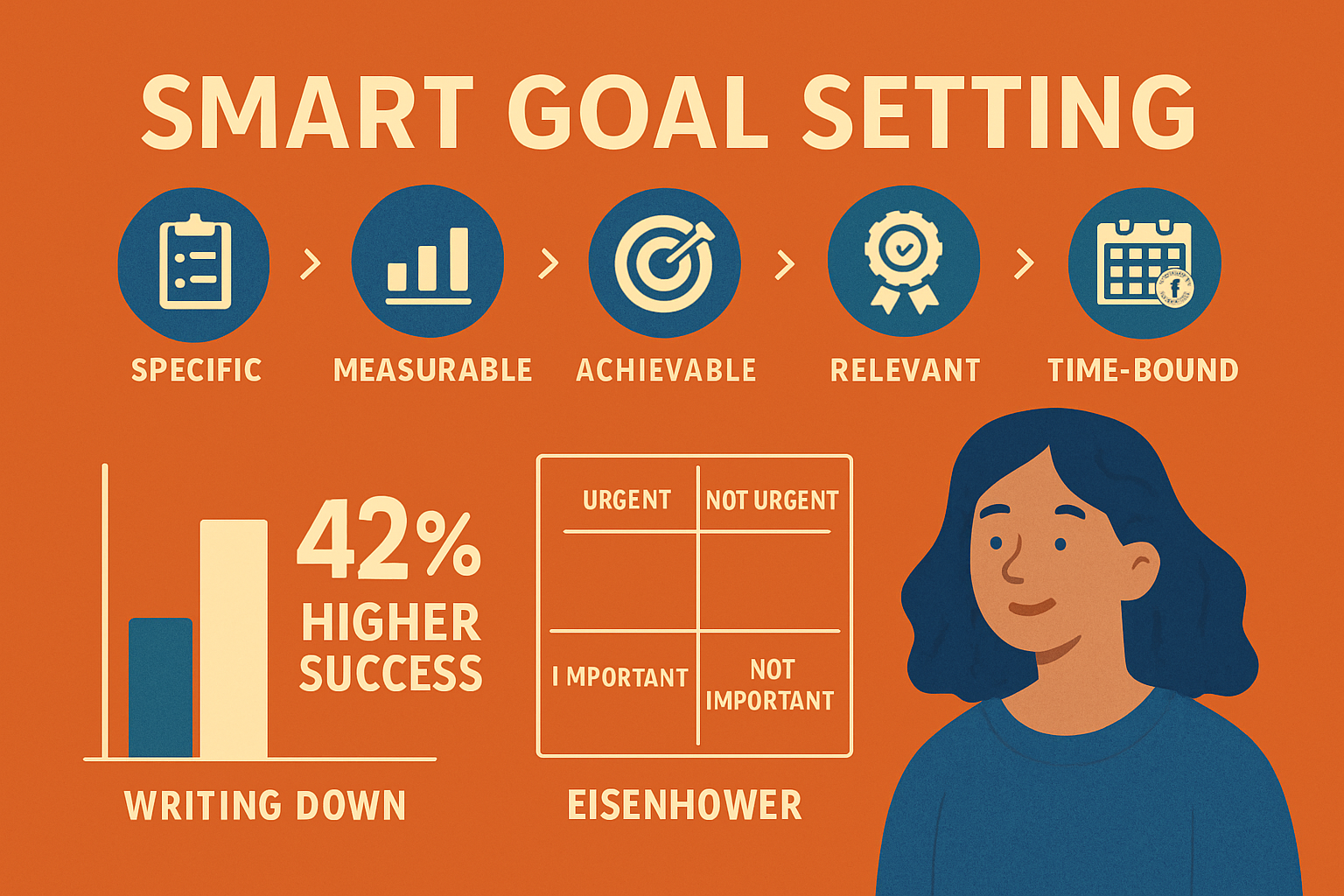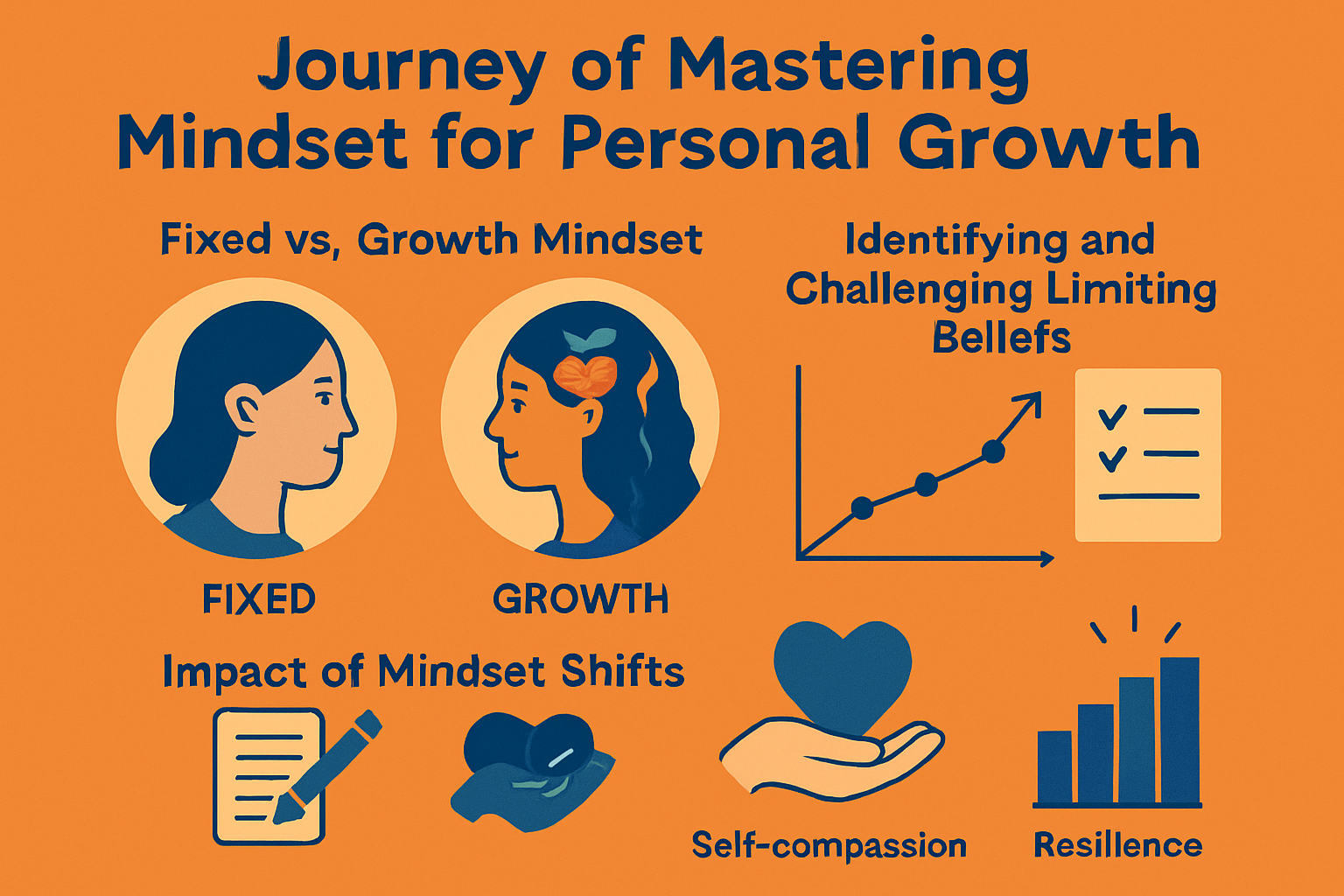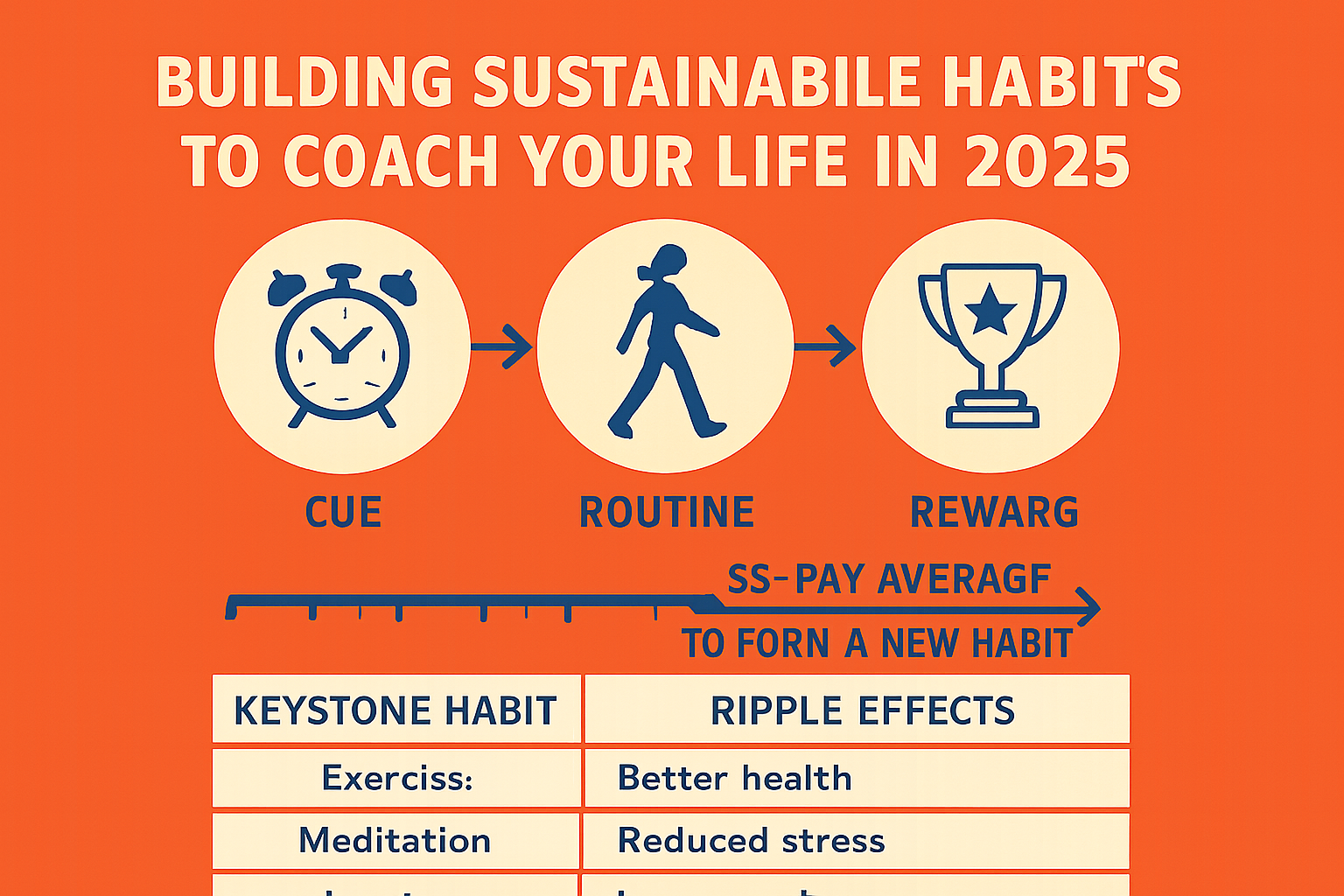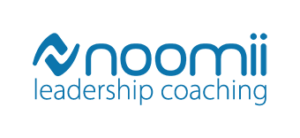Coach Your Life Guide: Achieve Personal Growth in 2025
Imagine if 2025 became the year you truly unlocked your full potential. What if you could take control and guide your growth, step by step, toward a more fulfilling and successful life?
This guide is designed to help you coach your life using proven strategies that empower you to set meaningful goals, overcome obstacles, and build habits that last.
You'll discover a clear, actionable framework for personal growth—one you can tailor to your unique journey. From mastering self-coaching basics to building daily routines and measuring progress, each step is crafted to support real, lasting change.
Get ready to embrace a year of transformation, learn practical tools, and take action to shape your future on your own terms.
Understanding the Foundations of Self-Coaching
Imagine being able to steer your own growth, set your direction, and break through barriers—all without needing a professional guide at your side. That’s the heart of learning to coach your life. But what does self-coaching really mean, and how can you use it to unlock new levels of confidence and achievement?
![]()
What Is Self-Coaching?
At its core, self-coaching is the practice of guiding your own personal development using structured reflection, goal setting, and intentional action. Unlike traditional coaching, you become both the coach and the client—designing your growth plan, tracking progress, and holding yourself accountable.
Self-coaching is grounded in principles like self-awareness, responsibility, and continuous improvement. If you’re curious about the fundamentals, life coaching basics and principles offer a solid foundation for understanding how to coach your life with purpose.
Self-Coaching vs. Professional Coaching
While both approaches aim for transformation, there are key differences. Self-coaching gives you autonomy, flexibility, and affordability, while professional coaching provides expert feedback and external accountability.
| Aspect | Self-Coaching | Professional Coaching |
|---|---|---|
| Guidance | Self-directed | Guided by a coach |
| Accountability | Personal responsibility | External accountability |
| Cost | Minimal/none | Paid sessions |
| Flexibility | High—on your schedule | Set by coach’s availability |
| Feedback | Self-assessment | Expert, objective feedback |
Recognizing these differences helps you decide when to coach your life independently and when outside support might be valuable.
The Science of Coaching Your Life
Self-coaching is more than just positive thinking. It’s rooted in science. Neuroplasticity—the brain’s ability to rewire and adapt—means your habits and thought patterns can change at any age. Motivation theory and behavioral psychology show that intentional reflection and goal setting can drive lasting change.
By applying these principles, you can coach your life to shift beliefs, build new routines, and sustain momentum.
Core Qualities of Effective Self-Coaches
Successful self-coaches share several qualities:
- Strong self-awareness and honest self-reflection
- Personal accountability for actions and outcomes
- Resilience in facing setbacks
- Willingness to learn and adapt
When you coach your life, these traits help you stick with your growth path, even when challenges arise.
Misconceptions About Self-Coaching
Some believe self-coaching is just “wishful thinking,” or that you must have all the answers. In reality, self-coaching is a structured, intentional process. It’s not about perfection, but progress. Another myth is that growth only happens with outside help. While experts can accelerate change, you have the power to coach your life from within.
The Power of Self-Reflection and Journaling
Journaling and regular self-reflection are cornerstones of self-coaching. They help you clarify your goals, process emotions, and track daily wins. Many who coach your life with journaling find it easier to spot patterns and plan next steps.
Success Stories: Real-Life Growth
Consider Sarah, a teacher who used self-coaching to overcome burnout. By journaling, setting small goals, and tracking her mindset, she reignited her passion for teaching and improved her well-being. She’s among the 80% of people who report increased self-confidence after engaging in coaching.
Learning to coach your life is both an art and a science. With the right mindset and tools, you can become your own best guide—unlocking growth, resilience, and fulfillment.
Step 1: Setting Clear and Achievable Goals for 2025
Setting goals is the heart of any plan to coach your life. Goals act like a compass, pointing you toward your vision and giving daily actions real purpose. In 2025, clear and achievable goals will be the building blocks of your personal growth journey.
Why does goal setting matter so much when you coach your life? When you define your goals, you create a roadmap for change. Without clear targets, progress is vague and easy to lose. Written goals, studies show, are 42% more likely to be achieved than unwritten ones.
A popular and proven method for setting effective goals is the SMART framework. SMART stands for:
| S | M | A | R | T |
|---|---|---|---|---|
| Specific | Measurable | Achievable | Relevant | Time-bound |
Let’s break this down:
- Specific: State exactly what you want to accomplish.
- Measurable: Define how you’ll track progress.
- Achievable: Make sure your goal is realistic.
- Relevant: Align the goal with your bigger vision.
- Time-bound: Set a clear deadline.
Using SMART goals helps you coach your life with clarity and focus. For example, instead of saying “I want to get healthier,” a SMART goal would be, “I will walk 30 minutes, five days a week, for the next three months.”
But how do you make sure these goals truly matter to you? Start by aligning them with your personal values. Ask yourself: What matters most in my life? How will achieving this goal help me live my values? When your goals reflect your core beliefs, motivation comes more naturally.
Once you have your big goals, break them down into smaller, actionable steps. For instance, if your aim is to write a book, set milestones: outline your chapters, write 500 words a day, and schedule weekly check-ins. This process makes even the loftiest goals feel manageable.
Prioritization is another key skill when you coach your life. Two effective techniques are the Eisenhower Matrix and the Pareto Principle (80/20 Rule):
- Eisenhower Matrix: Sort tasks by urgency and importance.
- Pareto Principle: Focus on the 20% of actions that drive 80% of your results.
Here’s a quick table to illustrate the Eisenhower Matrix:
| Urgent & Important | Not Urgent & Important |
|---|---|
| Do now | Schedule |
| Urgent & Not Important | Not Urgent & Not Important |
| Delegate | Eliminate |
Let’s look at some sample goals you might set to coach your life in 2025:
- Career: Complete a new certification by June.
- Health: Meal prep healthy lunches every Sunday.
- Relationships: Schedule a monthly date night with your partner.
- Personal Development: Read 12 books this year.
To avoid common goal-setting pitfalls, watch out for these mistakes:
- Setting vague or unrealistic goals.
- Failing to write goals down.
- Ignoring your “why.”
- Not tracking progress.
If you need extra support, explore effective goal setting tools that can help you stay organized and motivated.
Remember, to coach your life effectively, revisit your goals regularly. Adjust them as your circumstances and priorities change. Celebrate small wins along the way. Every step forward builds momentum and self-belief.
Coaching your life starts with the courage to dream, the discipline to plan, and the commitment to follow through. Your 2025 can be a year of remarkable growth—one clear, achievable goal at a time.

Step 2: Mastering Mindset and Overcoming Limiting Beliefs
Unlocking your ability to coach your life starts with understanding the incredible impact your mindset has on every area of growth. Whether you’re striving for career advancement, healthier habits, or deeper relationships, your beliefs and attitudes shape what you think is possible. If you want sustainable personal development in 2025, you must first examine how you think about yourself and your potential.
At the heart of this process is the concept of mindset. Carol Dweck’s research defines two primary mindsets: fixed and growth. A fixed mindset assumes your talents and intelligence are static, while a growth mindset believes these qualities can be developed through effort, learning, and persistence. When you coach your life, adopting a growth mindset is essential for overcoming setbacks and embracing challenges as opportunities for learning.
Many people are held back by self-limiting beliefs—deep-rooted assumptions that quietly dictate what you think you can achieve. These beliefs often sound like “I’m not good at public speaking” or “I’ll never be a leader.” The first step to coach your life is to identify these patterns. Journaling can help you catch negative self-talk and reveal recurring doubts. Once you spot a limiting belief, ask yourself: Is this truly a fact, or just a story I’ve been telling myself?
Cognitive Behavioral Coaching (CBC) offers practical techniques to reframe these thoughts. For example, instead of thinking, “I always fail,” challenge yourself to find evidence of times when you succeeded. CBC encourages you to replace all-or-nothing thinking with more balanced perspectives. This method is central when you want to coach your life through difficult transitions or step outside your comfort zone.
Building resilience and emotional intelligence also play a huge role in mastering mindset. Resilient individuals bounce back from setbacks faster, viewing failures as feedback rather than defeat. Practicing self-compassion—treating yourself with the same kindness you’d offer a friend—strengthens your ability to coach your life, especially when progress feels slow. Emotional intelligence helps you recognize and manage your emotions, making it easier to navigate challenges without getting overwhelmed.
Let’s look at a real-world example. Mia, a teacher, struggled with self-doubt when considering a leadership role at her school. Through self-reflection and mindset work, she identified her limiting belief: “I’m not a natural leader.” By using CBC techniques and focusing on her strengths, Mia gradually shifted her narrative. Within six months, she embraced new responsibilities and inspired her peers. Her story is one of many showing the power of mindset shifts in the journey to coach your life.
Research supports these strategies. Growth mindset interventions have been shown to increase achievement by up to 10%. For additional insights into the effectiveness of these approaches, explore the latest self-improvement industry statistics. These findings reinforce that with the right tools, anyone can coach your life to reach new heights.
Ultimately, mastering your mindset is about consistent practice. Make time for daily self-reflection, challenge limiting beliefs, and celebrate small mindset wins. Every step you take to coach your life brings you closer to lasting personal growth and a breakthrough year in 2025.

Step 3: Building Sustainable Habits for Lasting Change
Sustainable habits form the backbone of every successful attempt to coach your life. If you’re aiming for lasting change in 2025, understanding how habits work—and how to shape them—will give you a powerful advantage.
At the heart of habit formation lies a simple but effective loop: cue, routine, and reward. This model, popularized by Charles Duhigg, shows that every habit starts with a trigger, which leads to the behavior, and ends with a reward. By intentionally designing your cues and rewards, you can steer your actions in the direction you want.
Let’s talk about keystone habits. These are habits that create a ripple effect, making it easier to coach your life in other areas too. For example, regular exercise can boost energy and confidence, which then improves productivity and relationships.
Here’s a quick table of keystone habits and their impact:
| Keystone Habit | Positive Ripple Effect |
|---|---|
| Morning exercise | Increased focus, better mood |
| Journaling | Greater self-awareness |
| Meal planning | Healthier eating, less stress |
| Daily reading | Expanded knowledge, creativity |
When you coach your life, start small. Pick one keystone habit and break it down into manageable steps. Use clear cues—like setting out your workout clothes at night—and choose meaningful rewards, such as a favorite podcast after exercising.
Consistency is the secret sauce. Research shows it takes, on average, 66 days to solidify a new habit. If you’d like to dig deeper into the science, check out this time to form a habit study for an evidence-based perspective. Knowing this timeline can help you set realistic expectations as you coach your life through each new behavior.
Of course, obstacles will arise. Procrastination, dips in motivation, or unexpected setbacks can test your resolve. To coach your life successfully, anticipate these challenges and prepare strategies in advance. For instance, if motivation fades, revisit your “why” or adjust the environment—like removing distractions or enlisting a friend for accountability.
Celebrating small wins is crucial. Each milestone, no matter how minor, reinforces your commitment and keeps momentum alive. You might track your progress in a habit journal or use an app to visualize your streaks.
Finally, remember that habit-building is not about perfection, but about progress. If you miss a day, don’t give up—just get back on track. As you coach your life, these sustainable habits will become the building blocks for your biggest goals in 2025 and beyond.

Step 4: Leveraging Support Systems and Accountability
Imagine trying to coach your life alone, without encouragement or feedback. Even the most determined self-coach can lose momentum in isolation. Building a strong support system is essential for lasting personal growth.
Support systems create a safety net, offering both emotional encouragement and practical advice. When you coach your life, you’re not just relying on willpower—you’re tapping into a community that helps you stay focused and resilient, especially during setbacks.
Building Your Personal Support Network
Start by mapping out who is in your corner. Your network might include friends who cheer you on, family members who listen, mentors who offer wisdom, or colleagues who share similar goals. Each plays a unique role as you coach your life.
- Friends: Offer motivation and a listening ear.
- Family: Provide emotional grounding.
- Mentors: Share experience and guidance.
- Peers: Join you in pursuit of growth.
A well-rounded network ensures you get diverse perspectives and honest feedback. Reflect on who you trust and who inspires you—these are your pillars of support.
Accountability Partners and Mastermind Groups
Accountability is the secret ingredient for many who successfully coach your life. Research shows people with accountability partners are 65% more likely to reach their goals. An accountability partner checks in on your progress, celebrates your wins, and challenges you when you slip.
Mastermind groups take this a step further. These small, focused collectives meet regularly to share insights, brainstorm solutions, and hold each member to their commitments. Many educators and instructors find mastermind groups invaluable—they create a space for mutual learning and encouragement.
Consider this table summarizing key support options:
| Support Type | Main Benefit | Example Activity |
|---|---|---|
| Accountability Partner | Consistent progress checks | Weekly goal review |
| Mastermind Group | Creative problem-solving | Monthly group sessions |
| Online Community | Diverse perspectives | Forum discussions |
Leveraging Technology and Online Communities
In today’s digital world, technology expands your ability to coach your life. Online forums, coaching platforms, and social media groups connect you with like-minded individuals across the globe. These spaces provide instant feedback, resources, and the chance to celebrate milestones together.
Virtual coaching is also gaining ground. According to a virtual coaching and mental health study, online coaching support can enhance well-being and personal growth outcomes. Whether you join a Facebook group for educators, participate in a digital mastermind, or use an app for check-ins, technology makes support accessible anytime, anywhere.
Creating a Growth-Oriented Community
To truly coach your life, take the initiative to ask for help when needed. Be open about your goals and invite others to share the journey. Seek out communities where learning and encouragement are valued over competition.
Remember, personal growth flourishes in connection. Your support network will help you weather challenges, celebrate wins, and keep moving forward—one step at a time.
Step 5: Measuring Progress and Adapting Your Growth Plan
Measuring progress is a cornerstone of any successful attempt to coach your life. Without tracking your journey, it’s easy to lose sight of your achievements or miss areas needing improvement. To create lasting personal growth, you need a clear way to see where you started, how far you’ve come, and where you’re headed next.
Tracking your progress starts with identifying key metrics. These might include:
- Number of goals achieved
- Habits consistently maintained
- Skills or knowledge gained
- Improvements in mood, energy, or confidence
Consider using a table to summarize your personal metrics:
| Metric | How to Track | Review Frequency |
|---|---|---|
| Goals Completed | Checklist/Journal | Monthly |
| New Habits Formed | Habit Tracker App | Weekly |
| Personal Reflections | Journal Entries | Daily |
| Feedback from Others | Survey/Notes | Quarterly |
Reflection and feedback loops are essential when you coach your life. Take time each week to review what worked, what didn’t, and why. This self-reflection builds self-awareness, helping you spot patterns and adjust your strategies. Journaling is a powerful tool here. Write honestly about your progress, setbacks, and emotions. Over time, these notes become a roadmap of your growth.
Adapting your plan is just as crucial as measuring it. If you notice you’re not making progress, don’t be afraid to pivot. Maybe a habit isn’t serving you, or a goal no longer aligns with your values. Regular reviews—such as monthly or quarterly check-ins—allow you to reset your targets and keep your momentum strong. In fact, research shows that regular progress reviews can boost your chances of reaching your goals by up to 30%.
Feedback from others can also be invaluable. Ask trusted friends or mentors for their perspectives. Sometimes, external feedback highlights blind spots you might miss on your own. If you want to understand more about the science behind behavioral change and how self-efficacy supports habit building, check out this Self-efficacy in habit building research.
Let’s look at a quick example. Imagine someone using the coach your life framework to improve their health. They set a goal to walk 8,000 steps daily, track progress in a habit app, and journal weekly reflections. After two months, they notice motivation dips on weekends. By reviewing their data, they pivot—inviting a friend to join their walks. This simple adaptation helps them stay consistent, reinforcing both their habit and their confidence.
To summarize, when you coach your life, measurement and adaptation go hand in hand. Use clear metrics, regular reflection, and feedback to guide your journey. Be willing to adjust your growth plan as needed. This flexible, evidence-based approach ensures your personal development is not just a one-time effort but a lifelong, evolving process.
Preparing for the Future: Sustaining Personal Growth Beyond 2025
Personal growth is not just a one-year project—it's an ongoing journey. As you coach your life into 2025 and beyond, the goal is to build a mindset and routine that supports continuous development, not just short-term wins. Embracing this approach means seeing every year as a new opportunity to grow, adapt, and thrive.
Staying prepared for the future means anticipating change. The world is evolving rapidly, so those who coach your life successfully develop adaptability as a core strength. This includes being open to new experiences, learning from setbacks, and adjusting your goals as circumstances shift.
One of the most effective ways to future-proof your growth is to cultivate lifelong learning habits. These habits help you remain curious, resilient, and ready for whatever comes next. Consider this quick comparison:
| Lifelong Learner | Stagnation |
|---|---|
| Embraces change | Resists new ideas |
| Seeks feedback | Avoids challenges |
| Adapts to new technologies | Sticks to old routines |
| Reports higher satisfaction | Experiences more frustration |
To make growth part of your daily life, integrate learning and reflection into your routine. You might set aside time each week to read, take an online course, or journal about your progress. Consistency is key. If you need inspiration for building these routines, check out resources like Building daily habits for growth, which provide practical strategies to sustain your journey.
Looking ahead, digital tools and AI are reshaping how we coach your life. Apps for habit-tracking, virtual learning platforms, and AI-powered self-assessment can help you personalize and adjust your growth plan. Embracing these trends now means you’ll be better equipped to navigate future changes.
Try this visioning exercise: Imagine yourself at the end of 2026. What new skills have you mastered? What habits are now second nature? Write a brief letter from your future self, celebrating your progress and outlining your next growth steps.
Data shows that lifelong learners experience greater career success and life satisfaction. By making the choice to coach your life continuously, you’re investing in a future that’s both rewarding and adaptable, no matter what challenges arise.
As you take your first steps toward personal growth in 2025, remember that finding the right support can make all the difference. If you’re a coach who’s passionate about helping others achieve these kinds of breakthroughs, why not make it easier for clients to find you? By joining a trusted coaching directory, you’ll connect with motivated individuals who are ready to transform their lives—just like you’ve read about here. It’s simple and free to get started—Get Your Free Listing—and give more people the opportunity to thrive with your guidance.

Leave a Reply
Want to join the discussion?Feel free to contribute!